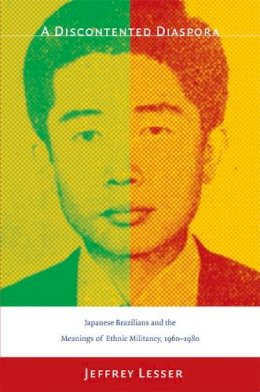
A Discontented Diaspora: Japanese Brazilians and the Meanings of Ethnic Militancy, 1960–1980
Jeffrey Lesser
Lesser draws on a wide range of sources, including films, oral histories, wanted posters, advertisements, newspapers, photographs, police reports, government records, and diplomatic correspondence. He focuses on two particular cultural arenas—erotic cinema and political militancy—which highlight the ways that Japanese Brazilians imagined themselves to be Brazilian. As he explains, young Nikkei were sure that their participation in these two realms would be recognized for its Brazilianness. They were mistaken. Whether joining banned political movements, training as guerrilla fighters, or acting in erotic films, the subjects of A Discontented Diaspora militantly asserted their Brazilianness only to find that doing so reinforced their minority status.
Product Details
About Jeffrey Lesser
Reviews for A Discontented Diaspora: Japanese Brazilians and the Meanings of Ethnic Militancy, 1960–1980
James N. Green
Hispanic American Historical Review
“Jeffrey Lesser adds significantly to our appreciation of the complexity of ethnic and racial relations in Brazil with this study of Japanese Brazilians during the period of military dictatorship. . . This is an important book that examines issues of the Brazilian Nikkei ethnic identity in unique ways. Lesser has done his research well.”
Daniel Masterson
Journal of Latin American Studies
“Jeffrey Lesser’s examination of Japanese Brazilians provides insight into a unique Japanese phenomenon. . . . This book is a fascinating analysis of a unique population that gives us a glimpse of the might-have-been world of Japanese migrants in countries such as the United States or Australia where World War II effectively halted or even reversed the establishment of large Nikkei communities.”
Yuriko Nagata
Asian Studies Review
"A Discontented Diaspora should be read by anyone interested in ethnicity, gender, and national identity, and should be a 'must-read' for students of the Brazilian military regime."
Victoria Langland
The Americas
